Oil Spills and Their Implications for the Economy and Environment
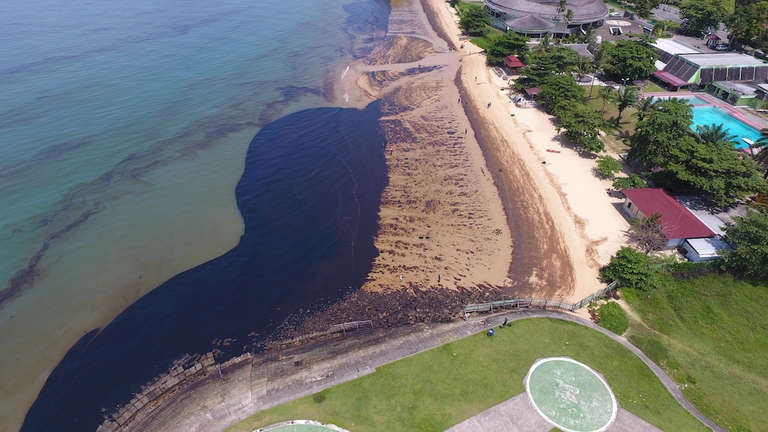
Photo Credit : AFP/Getty Images)
Marine ecosystems provide various important benefits for human survival, both ecologically and economically. In the natural balance, marine ecosystems play a crucial role as one of the main pillars supporting life on earth. With abundant biodiversity, marine ecosystems play an important role in maintaining global ecological balance.
Ecologically, marine ecosystems serve as habitats for various types of organisms ranging from microorganisms to large marine mammals. Phytoplankton, as the primary producers in the marine food chain, produce most of the oxygen and provide a food source for organisms in the sea. Additionally, marine ecosystems also regulate the global climate by absorbing carbon dioxide from the atmosphere and absorbing heat, helping to stabilize global temperatures.
From an economic perspective, marine ecosystems have significant value, such as in the fisheries sector, tourism, transportation and the oil and gas industry. Marine fisheries provide an important source of protein for humans. Furthermore, the exploitation of natural resources is a major driver of the country's economy.
Various activities at sea, especially in the economic sectors such as oil and gas drilling, shipping industry and oil transportation, can increase the risk of oil spills. Oil spills are a serious problem that can have adverse effects on the economy, environment and human life in general.
Oil contains hazardous chemicals that can disrupt the life of organisms in the sea. Marine organisms, such as fish, living in water affected by oil spills will absorb these chemicals, which can cause death. Moreover, fish that can survive cannot be consumed by humans because they contain chemical toxins in the form of polycyclic aromatic hydrocarbons (PAH) (Ahyadi et al., 2021), (Theresia, 2021).
According to Law No. 32 of 2009 concerning Environmental Protection and Management, Article 1 Paragraph 14 states that "Environmental pollution is the entry or inclusion of living beings, substances, energy and/or other components into the environment by human activities, exceeding the environmental quality standards that have been established". Therefore, this oil spill can also be referred to as a form of water pollution.
This article discusses how economic activities at sea can contribute to the risk of oil spills that have an impact on the environment and the local economy.
Impacts of Oil Spills on the Environment and Economy
Oil spills in the sea have significant impacts on the environment and the economy. In terms of environmental impacts, they can lead to mass mortality of various marine organisms. When oil is spilled on the water surface, it forms a layer that blocks sunlight penetration, disrupting the process of photosynthesis and threatening the sustainability of marine life. Furthermore, oil reaching coastlines can contaminate coastal ecosystems, causing damage to mangroves, seaweed and coral reefs. Organisms living in these ecosystems can suffer from oil poisoning or habitat loss, resulting in long-term effects on biodiversity and ecosystem functioning.
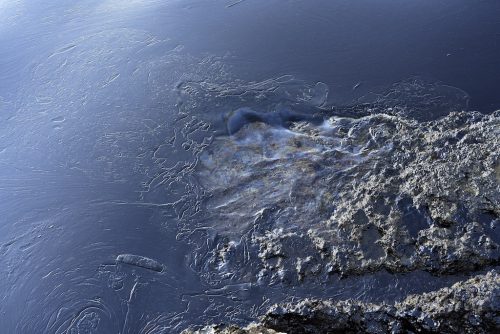
An oil spill at sea (Photo Credit : Milos Bicanski/Getty Images)
The fishing industry is one of the sectors most affected by oil spills. For instance, fish farming activities rely on clean seawater. When oil reaches fish farming areas, it contaminates fish and other marine species, rendering them unfit for consumption due to decreased quality. Additionally, oil spills in water can tarnish the reputation of fishery products in a region. Consumers may be hesitant to purchase products from areas affected by oil spills, leading to a decrease in demand and economic losses for the fishing industry.
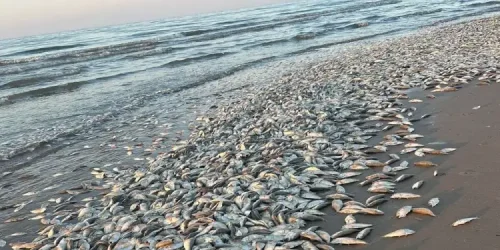
Thousands of fish die due to solar waste pollution in Pandan Bay, Lampung, 2023 (Photo Credit : Portonews)
Conservation Efforts in Addressing Oil Spills
Efforts to address oil spills in the sea are crucial in minimizing their negative impacts on the environment and the economy. These efforts can be categorized into prevention, containment and cleanup, and restoration.
Prevention efforts involve regular maintenance and inspection of ships and pipelines, ensuring compliance with regulations and the use of the latest technology in all operations, crew training and the implementation of stricter safety regulations.
Containment and cleanup of hazardous pollutants can be achieved through physical, chemical and biological means, including:
- Using oil booms to prevent the spread of oil spills by blocking their path (National Oceanographic, 2021).

Oil Boom Pertamina 2023 (Photo Credit : Pertamina)
- Utilizing sorbents that can absorb oil through adsorption, as oil adheres to the surface of the sorbent and can be easily separated (National Oceanographic, 2021), (Pagnucco, R and Phillips M, 2018).
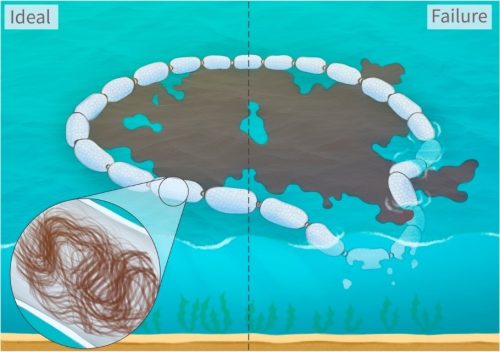
Sorbent (Photo Credit : Pagnucco, 2018)
- Implementing bioremediation, which involves restoring contaminated environments by utilizing microorganisms, such as bacteria, to break down pollutants into harmless compounds. This technique is relatively more environmentally friendly and flexible, as it utilizes microorganisms as bioremediation agents. The success of bioremediation techniques depends on the geography, body of water, habitat and environmental characteristics of the contaminated area.
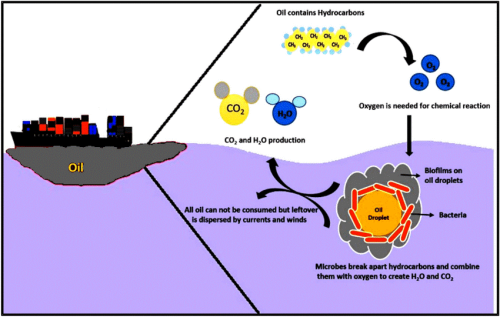
Bioremediation (Photo Credit : Balan, B., et all., 2021)
Bioremediation is generally carried out using three approaches:
- Bioaugmentation : Adding microorganisms when the contaminated environment lacks sufficient microorganisms to degrade the pollutants.
- Bioattenuation : Enhancing the natural degradation capabilities of existing microorganisms in the environment.
- Biostimulation : Providing nutrients and conditions that promote the growth and activity of indigenous microorganisms to enhance pollutant degradation.
Restoration efforts focus on restoring the affected ecosystems to their pre-spill condition. This may involve the replanting of mangroves or coral reefs, rehabilitating affected wildlife populations and monitoring the long-term effects of the spill on the ecosystem.
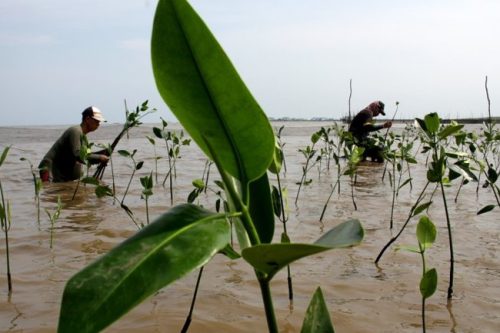
Restoration of mangroves due to oil spills (Photo Credit : Arnas Padda/AntaraNews)
Conclusion
Oil spills have significant implications for the economy and the environment. The negative impacts on marine ecosystems can result in biodiversity loss, disruption of food chains and habitat destruction. The fishing industry, tourism sector and coastal communities are particularly vulnerable to the economic consequences of oil spills.
Efforts to prevent oil spills, effectively contain and clean up spilled oil and restore affected ecosystems are crucial in mitigating the impacts. Regular maintenance and inspections, stricter regulations and the use of advanced technologies can help prevent spills. Effective containment and cleanup methods, such as the use of oil booms, sorbents and bioremediation, can minimize the spread and impact of spilled oil. Restoration efforts aim to restore the affected ecosystems and support the recovery of marine life and economic activities.
It is essential for governments, industries and communities to collaborate in preventing oil spills, responding effectively when spills occur and supporting the restoration of affected ecosystems. By prioritizing environmental protection and adopting sustainable practices, we can minimize the risks and consequences of oil spills in the sea, safeguard marine ecosystems and sustain the economy for future generations.
References
Analisis Dampak Oil Spill di Teluk Balikpapan terhadap Kehidupan Masyarakat dalam Perspektif Hukum dan Lingkungan. Ahyadi, dkk, 2021. Jurnal Bumi Lestari Volume 21, No. 01, Tahun 2021.
Bioremediasi Polutan Laut Tumpahan Minyak. Theresia, M., 2021.
UU no. 32 tahun 2009 tentang Perlindungan dan Pengelolaan Lingkungan Hidup.
Dampak Tumpahan Minyak Akibat Proses Bunker Bahan Bakar Kapal. Kamil, J. 2021. National Oceanographic (National Oceanographic (national-oceanographic.com)
Comparative Effectiveness of Natural by-products and Synthetic Sorebts in oil Spill Booms. Pagnucco, R and Phillips M, 2018. Journal o Environmental Management.
Microbial Biofilm Ecology, in Silico Study of Quorum Sensing Receptor-ligand Interaction and Biofilm Mediated Bioremediation. Balan, B., et all., 2021. Journal Microbiology.
Studi Literatur Alternatif Penanganan Tumpahan Minyak Mentah Menggunakan Bacillus subtilis dan Pseudomonas putida (Studi Kasus: Tumpahan Minyak Mentah Sumur YYA-1). Wardhani, WK dan Titah HS, 2020. Jurnal Teknik ITS Vol 9 No 2 (2020).

